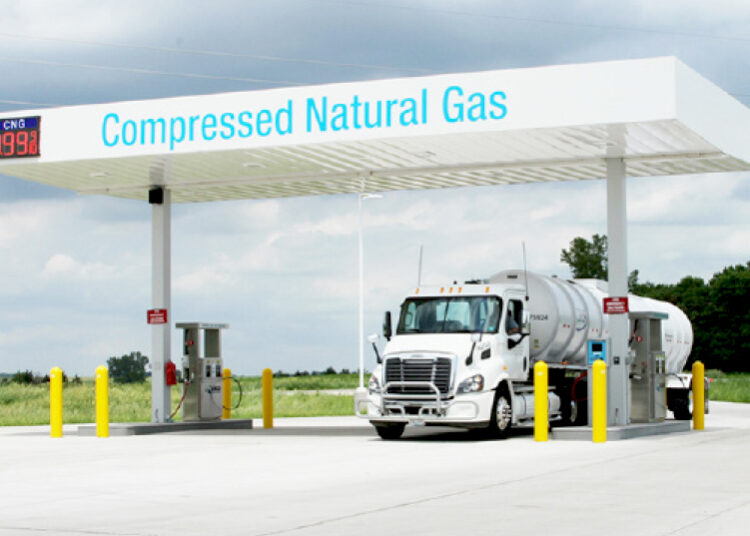The Presidential Compressed Natural Gas Initiative (PCNGI) is expanding the country’s compressed natural gas (CNG) infrastructure, with over 175 new stations currently being developed across the country, in addition to the 53 daughter stations already operational and more than $500 million invested in the sector within the past year.
Programme director and chief executive of the PCNGI, Engr. Michael Oluwagbemi, who made these known, noted that since the initiative’s launch in May 2024, it has made progress from a modest beginning of just 11 CNG stations nationwide, “we have witnessed an unprecedented increase in both infrastructure and vehicle adoption,” he said.
According to him, the number of CNG vehicles on Nigerian roads has surged from 4,000 to over 50,000, with projections to reach 100,000 within this year.
This growth, Oluwagbemi said, has driven demand for refueling stations, prompting significant private and public sector investments with companies such as AY Shafa, Femadec, Greenville, NNPCL, Bovas, and NIPCO spearheading the development of new stations, covering major urban centers and underserved regions alike.
The PCNGI said it is also supporting the launch of 24 new sites over the next six to nine months, with several already operational, including the first activated site in Ilorin. These efforts are complemented by investments from the Midstream Downstream Gas Infrastructure Fund, which recently awarded equity funding to gas projects focused on expanding the CNG network.
Oluwagbemi acknowledged the skepticism that greeted the initiative’s early days but urged patience, noting that “engineering feats take time” and emphasising the long-term benefits of transitioning to cleaner, more affordable fuel options.
“From May 2024, the PCNGI set out to implement its mandate in line with the directive and vision of Mr. President, which were to: Incentive the adoption of CNG and EV vehicles to ensure sustainable transportation for all Nigerians; Facilitate investments into the alternative energy sector for transportation and Coordinate regulation of the emerging sector for rapid growth.
“Because the initial desire of the President was greeted with skepticism, the start-up work of the PCNGI was to embark on an intensive awareness campaign which was conducted from May to October 2024; hardly any CNG vehicles were on our roads, and no demand at the few eleven CNG stations nationwide since a 2017 pilot by NNPCL. Many, even our most ardent adherents, were not convinced anyone would want CNG vehicles. Misinformation and fake news on CNG dominated the media space,” Oluwagbemi explained.
“One year out, We are pleased that even the doubting Thomases are singing a new tune. With over 50,000 vehicle count and rising to 100,000 the queues at CNG stations are naturally going to rise, because of such unprecedented increase (from mere 4000) in vehicle count as a result of massive incentive provided by the administration and the breakthrough in awareness due to the economic benefits of the switch. Nigerians love CNG and the programme is working.
“The private sector as well as public partners that will develop the necessary infrastructure to meet the rising demand of CNG vehicles are taking note. Just last week, two new daughter stations in Abuja were commissioned with AY Shafa and Femadec investing in these ventures. He said that both entities have nine and 21 daughter stations respectively in the works in the next one year.
“For Femadec, the dual benefit of leading the charge of building a CNG ecosystem in 20 universities is an icing on the cake. This week, Yola is stepping up with Greenville investing in its intensive roll out of LCNG stations in 51 locations across the North and SE as well as hard to reach places. Over 175 stations are being rolled out nationwide by various partners.
In addition to Greenville and Femadec, the PCNGI is backing partners to roll out 24 sites in the next six to nine months, with one site already activated in Ilorin. Port Harcourt, Ado Ekiti, Lokoja, Abuja, Aba and Enugu will all go live within the next 60 to 120 days to dispense CNG, to scale the refueling on-lending initiative heralded with the first launch in Ilorin last year that have already transformed that local economy.
“Aside from these, NNPCL is investing. Additional eight stations to its current stock of 12 are being finished as we speak and another 40 of 100 in Phase 2 of her roll out plan is being finalised. Bovas is launching two sites in Ibadan any moment from now from its eight station roll out of ultra modern CNG stations and ecosystem. NIPCO’s eight stations in addition to 23 already live across the country will be completed within six months,” he said.
Recall that the Midstream Downstream Gas Infrastructure Fund, awarded 10 new entries equity investments to develop their various gas projects. Three of these were focused on developing CNG stations. This was in addition to four of the six of initial N123 billion investments made last year by MDGIF being directed at the sub-sector.
In one year, the CNG sector has attracted over $500 million in investments and created over 10,000 direct jobs. 255 new conversion centers that didn’t exist last year and 53 daughter stations exist today as a result of some of those investments.
“Nigeria is making progress with respect to CNG infrastructure but engineering feats take time. It took over 70 years to get addicted to petrol and diesel, it will take more than seven months to be weaned off the addiction.
“We plead patience with the skeptics. At the Presidential CNG Initiative, we remain committed to our mandate while working hard across the value chain to deliver the goodies Mr. President has promised to all Nigerians. Rome was not built in a day, and CNG will take more than a few days,” Oluwagbemi stated.
We’ve got the edge. Get real-time reports, breaking scoops, and exclusive angles delivered straight to your phone. Don’t settle for stale news. Join LEADERSHIP NEWS on WhatsApp for 24/7 updates →
Join Our WhatsApp Channel










